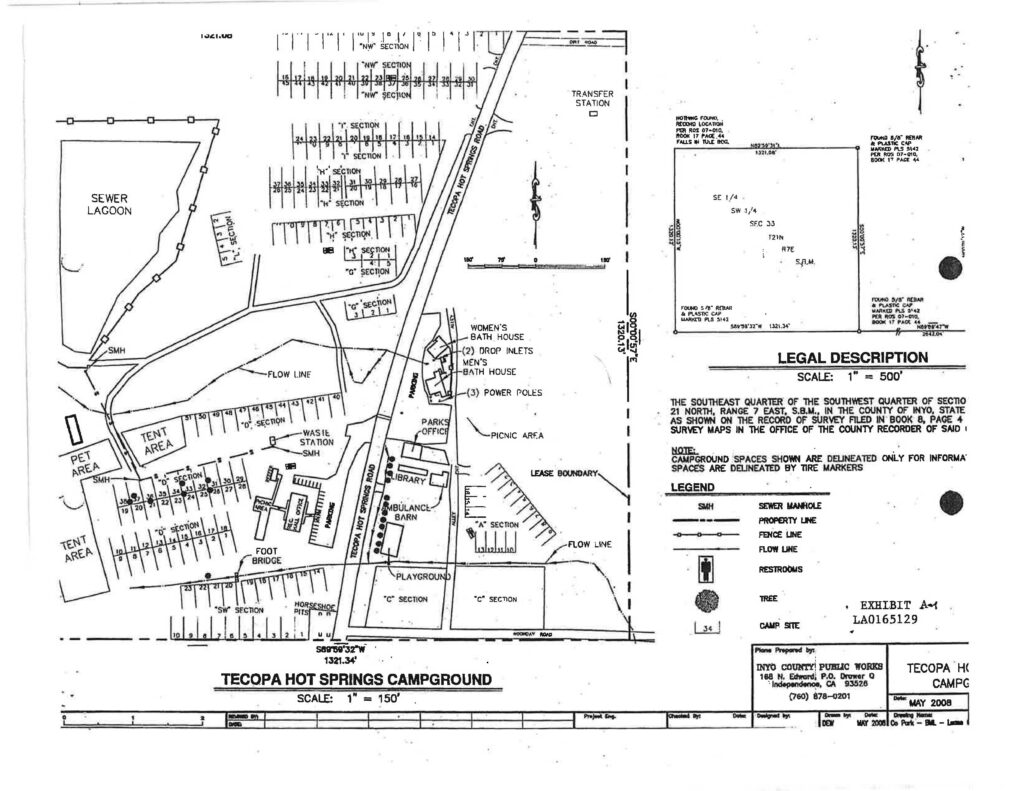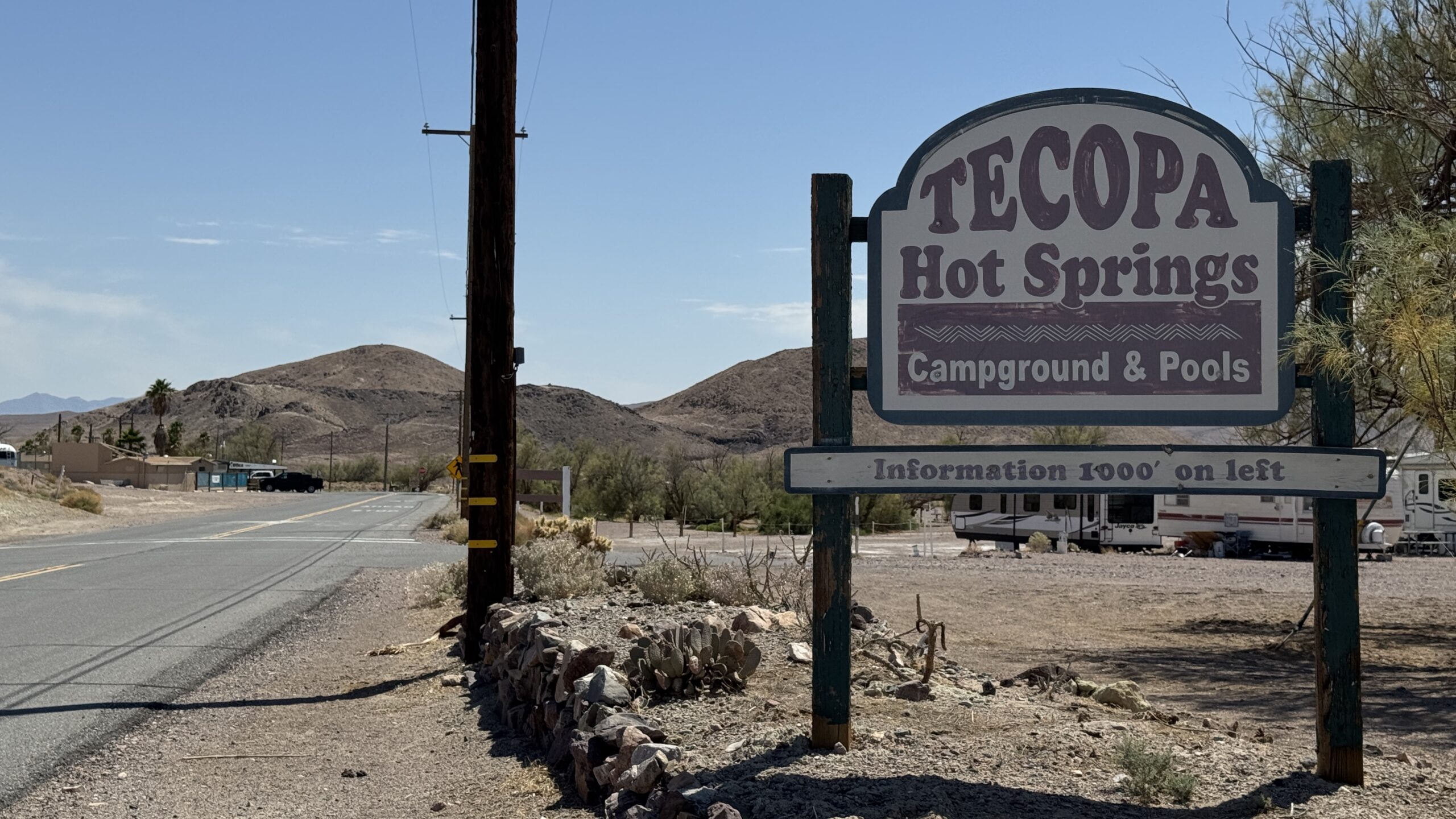The Inyo County Board of Supervisors is set to approve a new ten-year agreement at their October 21 meeting, granting Flippin Happy Campers & Lance Hamrick LLC the right to operate and maintain the Tecopa Hot Springs Campground and Pools, one of the Amargosa Basin’s most enduring public amenities. The contract marks the third public–private partnership to oversee the 40-acre site since 2004 and extends through 2035, with two optional five-year renewals that could carry the arrangement to 2045.
According to the contract, “the County will invest approximately $15,000 to ready the facility for the new Concessionaire,” an upfront expense expected to be offset by incoming concession revenue. This may include recent electrical upgrades done onsite by D&J Electrical.
Under the new terms, the operator’s payments to the County are structured to grow alongside the facility’s success. For the first two years, the concessionaire will pay a minimum of $10,000 or five percent of gross receipts, whichever is greater. In the third and fourth years, that figure rises to $12,000 or six percent, and beginning in year five, to $15,000 or seven percent—a rate that continues for the remainder of the term. Each year, the operator must provide the County with full financial statements and audited records, ensuring that public oversight extends to every transaction within the gates.
All concession fees, the County notes, will be deposited into a County-managed trust account, which may be accessed by the operator “for approved facility upgrades and infrastructure investments, at their discretion and in alignment with County guidelines.” The arrangement is intended to ensure that revenue generated from visitors is reinvested directly into the maintenance and improvement of the springs themselves.

But it is the question of who may enter—and under what terms—that touches most directly on the social character of Tecopa. The contract states plainly that there will be “free access to hot springs pools for local residents (ID required).” On its face, the promise appears to protect community access, but the requirement also introduces a technical limitation: many people who live and work seasonally in Tecopa, or who claim mailing addresses elsewhere, may not qualify as “residents” under a strict reading of the policy.
To address this ambiguity, the County also mandates that the operator offer “steep discounts for long-term resident visitors,” a category that quietly acknowledges the town’s fluid population and transient housing patterns. The inclusion of this clause broadens access while creating, in practice, a hierarchy of pricing that could privilege certain in-groups over others. A third provision ensures that Indigenous people are explicitly recognized, promising “special rates for tribal members.” Together, these clauses sketch a layered approach to equity—one that safeguards access but may also mirror the community’s own complexities of belonging and identity.
The contract describes these measures as “designed to preserve the facility’s role as a community asset while enhancing its appeal to visitors.” The operator, meanwhile, assumes responsibility for staffing, utilities, and upkeep, under County supervision that includes the right of entry, audit, and approval for any major expenditure from the trust account.
For Inyo County, the agreement represents an effort to define what community access means in a town where seasonal residents, weekend visitors, and local neighbors often blend into the same hot spring mist.
Oversight and Enforcement
The contract’s enforcement powers are as robust as its financial ones. It grants the County “the right of entry upon the campground premises at all reasonable times” and authorizes officials to inspect operations, facilities, and maintenance records. If the concessionaire fails to maintain sanitary conditions or address hazards after notice, the County may “do any and all work of any nature necessary for the immediate preservation, maintenance and operation of the campground and bathhouses and charge Concessionaire the cost thereof.”
The agreement also defines what constitutes default—ranging from missed payments to prolonged closure of ten days or more—and gives the County the right to terminate the contract or recover damages if the operator fails to cure violations within thirty days. Even late payments incur a five-percent penalty.
These provisions are reinforced by an annual maintenance schedule included as an exhibit, detailing daily cleaning requirements, water quality logs for each hot pool, and monthly inspections of plumbing, electrical systems, and ADA compliance.
Transparency as Policy
By contrast to the simpler agreements of earlier years—where concessionaires largely operated under broad service expectations—this document introduces an infrastructure of accountability designed to withstand turnover and time. It specifies audit rights, reporting deadlines, and the chain of County approval for every material expenditure. It even lists, in an attached exhibit, the precise facility upgrades eligible for reinvestment—from replacing bathhouse wiring to paving accessible pathways and modernizing sewer and power systems.
In this respect, the 2025 agreement transforms the Tecopa Hot Springs Campground from a loosely monitored enterprise into a governed public asset, with performance measures visible to auditors and, by extension, the public.
Continuity Through Oversight
As with previous operators, the County will continue to manage the adjacent community center, library, playground, and sewage lagoon, while the concessionaire maintains the campground, pools, dump station, and store. County officials describe this structure as part of a strategy for “thriving communities and quality parks and recreation amenities.”
In seeking to approve the new agreement, the Board reaffirms its long-standing belief in public–private partnership, but now under the light of codified accountability. Inyo County’s own summary of the deal perhaps says it best: this model “has allowed for consistent service delivery and regular staffing, maintenance, and upkeep of the facility.”
The new contract builds on that foundation—with stronger guardrails, clearer books, and renewed recognition that the hot springs of Tecopa belong, ultimately, to the public who soak in them.
Then vs. Now
When Inyo County last signed a concession agreement for Tecopa Hot Springs in 2021, the deal was a modest one — a continuation of the existing arrangement with the same local operator. The County collected a flat $5,000 annual fee, often waived in exchange for minor repairs, and relied largely on trust to keep the facility open and in reasonable shape. There was no mention of resident access, no percentage-based revenue sharing, and little formal oversight beyond the occasional request for records.
Four years later, the tone of the new 2025 contract could not be more different. Where the old agreement leaned on familiarity, the new one leans on transparency. The operator, Flippin Happy Campers & Lance Hamrick LLC, must now submit annual financial statements by June 30 each year, with books open to audit by both the Inyo County Auditor and the Grand Jury. The County reserves the right to inspect the grounds at any time, perform emergency maintenance if needed, and charge the operator for any costs incurred. What was once an informal partnership is now an enforceable framework.
The County didn’t just raise the rent; it rewrote the rules. The old deal ran mostly on goodwill and continuity. The new one runs on public oversight, structured reinvestment, and a renewed acknowledgment that Tecopa’s hot springs belong first and foremost to the community that has long gathered around them.


Leave a Reply